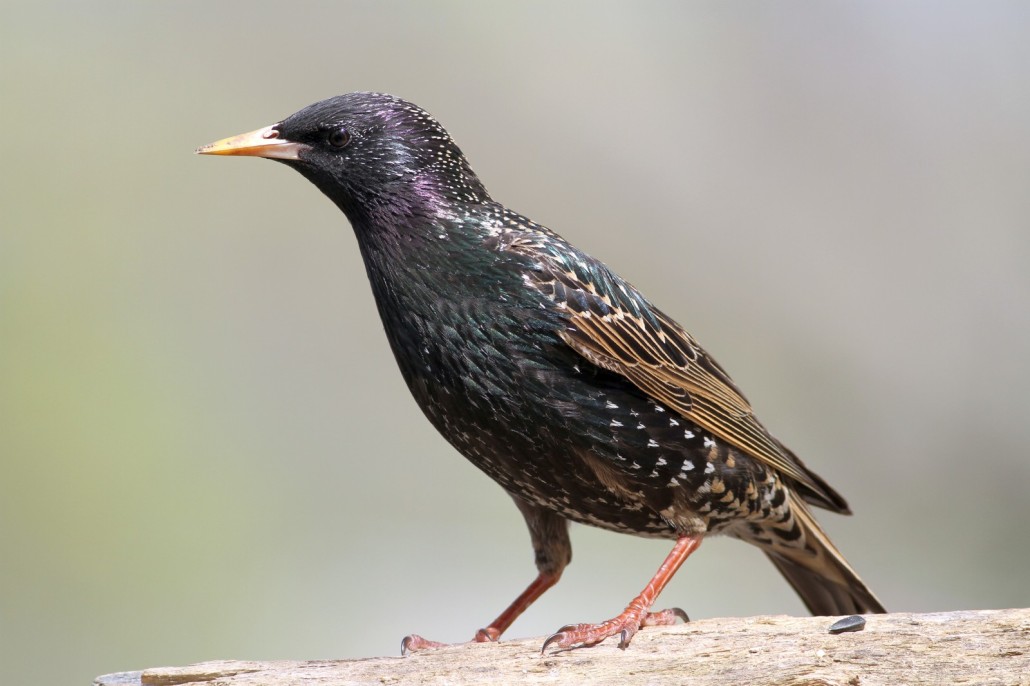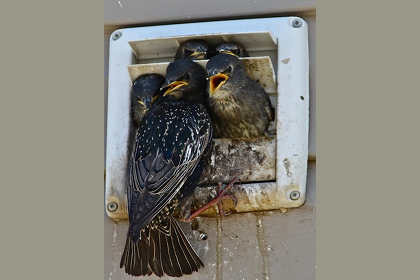
European Starling Removal & Control in Virginia
(804) 729-0046 or toll-free at (888) 824-7383
Need Bird Removal, Bird Trapping or Bird Control in Virginia? Our Richmond Virginia bird control experts can quickly and safely remove starlings in your bathroom vent, dryer vent, attic or fireplace.
Did you know that the European Starling is the most common bird that gets into bathroom and dryer vents?
Our bird control services include birds in vents, pigeon control at commercial buildings and shopping centers, installation of bird netting, installation of bird spiking, bird removal and control, birds in your house and all types of bird proofing services throughout Henrico, Glen Allen, Richmond, Midlothian, Charlottesville, and other areas of Virginia. Contact us at (804) 729-0046 or toll-free at (888) 824-7383 for all your Virginia bird removal & control needs.
Facts About European Starlings
European starlings (Sturnus vulgaris) were purposefully introduced from Europe into this country. After two failed attempts, about 60 European starlings were released into New York’s Central Park in 1890 by a small group of people with a passion to introduce all of the animals mentioned in the works of William Shakespeare. The offspring of the original 60 starlings have spread across the continental United States, northward to southern Canada and Alaska, and southward into Central America. There are now an estimated 150 million starlings in the United States.
Food and Feeding Habits of European Starlings
- Starlings forage on lawns and other areas of short grass, such as pastures, golf courses, turf farms, and similar places.
- One of their very favorite foods is the large larva of the leatherjacket, or marsh cranefly (Tipula paludosa), which eats the roots of grass plants. Leatherjackets (like starlings) are not native here, and were unintentionally introduced from Europe.
- Starlings have unique jaw muscles designed both to clamp shut and spring open, allowing them to use their bills to pry things open, including openings in the soil.
- Starlings also eat fruit, seeds and suet at bird feeders, and food scraps.
Nesting and Roosting Sites of European Starlings
- Starlings nest in suitable holes and crevices in buildings, utility poles, decaying trees, and holes in cliff faces, 6 to 60 feet above ground.
- Males establish territories and choose nest sites, then attract females.
- Male starlings are very aggressive when claiming nest sites, taking over nest boxes and other cavities even while they are in use by such native birds as bluebirds, woodpeckers, and swallows.
- The nest is an untidy collection of grasses, bark strips, twigs, rope, and other debris. The nest cup is lined with feathers, mosses, or other soft material.
- In late summer and fall, starlings form large flocks and roost in large deciduous trees. In early winter, when trees lose their leaves, starlings roost in areas that provide protection from wind and cold, including coniferous trees, areas under bridges, and in grain terminals and barns.
- During the night, individual birds change their position in the roost to minimize energy loss, with older birds maintaining the “best” positions.
Reproduction Habits of European Starlings
- Starlings can be building nests, sitting on eggs, or caring for young anytime from mid February to early July.
- Four to six slightly glossy, pale blue eggs hatch after an incubation period of 11 to 13 days.
- Both parents take turns with incubation during the day; at night only the female remains on the nest.
- The young begin to fly at 18 to 21 days of age, and out-of-nest care by parents lasts 2 to 4 days.
- A pair of adults can raise two broods per year. The female typically starts laying a second brood shortly after the first one fledges.
- Starling eggs (which are about the same size, shape, and color as robin eggs) often are found lying on the ground. It is believed that the females drop eggs if they are ready to lay, but the nest is not yet complete or has been taken over by another bird.
Bird Diseases
Starlings carry several transmittable diseases that can be caught by pets, livestock and humans. Their droppings contribute to several health-related conditions, as droppings are composed of fungi and airborne spores. The most common transmittable disease birds carry include:
- Histoplasmosis
- Cryptococcus
- Toxoplasmosis
- Encephalitis
- Salmonellas
Common Problems Associated with European Starlings
- Birds in dryer vents
- Birds in bathroom vents
- Birds in attics
- Birds in soffits
- Birds in vents
- Bird mites and other parasites
- Fire hazards from nesting materials
- Unpleasant odors from bird feces (bird poop)
Legal Status of European Starlings
Starlings are exempt from the Federal Migratory Bird Treaty Act (MBTA) of 1918, which was passed for the protection of migratory birds. Their nests, eggs, young, and/or adults may be removed or destroyed at any time. No permit is required.
Our Richmond Virginia bird control experts can humanely get rid of these bird pests and repair or seal bird entry points. We are Virginia’s leading bird removal & bird control company. If you have a question about birds in your vent, bird netting, or any type of bird control problem animal control operators of Richmond, VA have the solutions to your animal problem.
Our Service Area for Bird Removal & Bird Control in Virginia
Virginia Professional Wildlife Removal Services is a full-service animal wildlife trapping, animal removal, animal capture, pest control, animal control, and wildlife management company serving counties, cities, towns and communities throughout Virginia. We provide residential, commercial, and industrial animal removal, animal control, animal trapping, animal capture, pest control and wildlife management services in Afton, Albemarle County, Alexandria, Amelia County, Annandale, Arlington, Ashburn, Ashland, Barboursville, Bellwood, Belmont, Bensley, Bermuda Hundred, Bon Air, Boyd Tavern, Brandermill, Bumpass, Burke, Central VA, Centreville, Chamberlain, Charlottesville, Chesapeake, Chester, Chesterfield County, Colonial Heights, Crozet, Cuckoo, CVille, Dale City, Doswell, Dumbarton, Earlysville, East Highland Park, Enon, Ettrick, Fairfax, Fair Oaks, Ferncliff, Fluvanna County, Fredericksburg, Genito, Glen Allen, Glenora, Goochland County, Gordonsville, Gum Spring, Hadensville, Hampton, Hampton Park, Hanover County, Harrisonburg, Harrogate, Hening, Henrico County, Highland Springs, Hopewell, Innsbrook, Jefferson Davis, Kents Store, Keswick, Lake Anna, Lake Monticello, Lake Ridge, Lakeside, Laurel, Leesburg, Lewiston, Lignum, Locust Grove, Louisa County, Maidens, Manakin, Manakin-Sabot, Manassas, Manchester, McLean, Montrose, Motoaca, Meadowbrook, Mechanicsville, Midlothian, Mineral, Moseley, Newport News, Norfolk, North Courthouse, North Garden, Oilville, Orange County, Palmyra, Pantops, Petersburg, Portsmouth, Powhatan County, Reams, Reston, Richmond, Richmond County, Robious, Rockville, Rockwood, RVA, Salisbury, Sandston, Sandy Hook, Scottsville, Shannon Hill, Short Pump, South Rockwood, Spring Run, Staunton, Stoney Point, Suffolk, Tidewater, Troy, Tuckahoe, Va, Varina, Virginia, Virginia Beach, Waynesboro, Williamsburg, Winchester, Winterpock, Woodlake, Wyndham, and the surrounding areas of Virginia.
Please Complete Our Simple Contact Form Below:
 Contact Us at (804) 729-0046 or toll-free at (888) 824-7383 for Virginia animal trapping, animal control, wildlife removal, pest control, animal capture, animal exclusion or wildlife management in VA involving:
Contact Us at (804) 729-0046 or toll-free at (888) 824-7383 for Virginia animal trapping, animal control, wildlife removal, pest control, animal capture, animal exclusion or wildlife management in VA involving:
- Bats (Little Brown Bat, Big Brown Bat, Others)
- Beavers
- Bees
- Birds
- Bobcats
- Canada Geese
- Chipmunks
- Copperhead Snakes
- Cottonmouth Snakes
- Coyotes
- Dead Animal Removal
- Deer
- European Starlings
- Flying Squirrels
- Foxes (Red and Gray)
- Groundhogs
- Mice
- Moles
- Muskrats
- Opossums
- Otters
- Pigeons
- Possums
- Raccoons
- Rats
- Rattlesnakes
- Skunks
- Snakes
- Southern Flying Squirrels
- Squirrels
- Stinging Insects
- Voles
- Woodchucks
Give us a call to get rid of birds in your bathroom vent or dryer vent. We are your local bird removal experts in the Henrico, Glen Allen, Richmond, Midlothian, Charlottesville, and other areas throughout Virginia. Call us at (804) 729-0046 or toll-free at (888) 824-7383.
